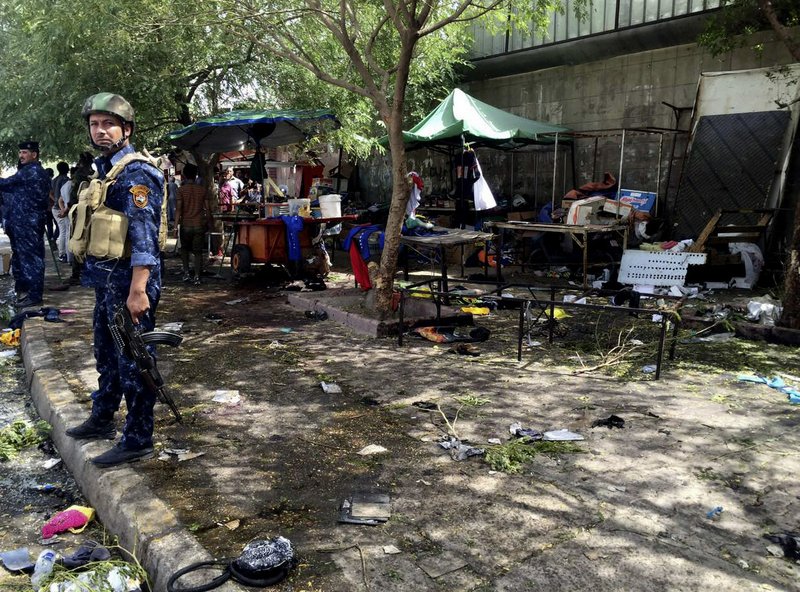BAGHDAD -- A suicide bomber rammed his explosives-laden car into a checkpoint outside a Shiite town north of Baghdad on Monday, killing at least 14 people, Iraqi officials said, while a string of bombings in the Iraqi capital killed nine more people.
Monday's checkpoint bombing took place at one of the busy entrances to the town of Khalis, about 50 miles north of the Iraqi capital, a police officer said. The town is a Shiite enclave surrounded by Sunni areas in the restive Diyala province.
Eight policemen and six civilians were killed and up to 41 people were wounded, the officers said, adding that the explosion also damaged about 20 cars lined up at the checkpoint.
In an online statement, the Islamic State militant group claimed responsibility for the attack. The Associated Press could not verify the authenticity of the statement, but it was posted on a website commonly used by the extremists.
In Baghdad, separate bomb explosions rocked three commercial areas -- Ghazaliya, Bayaa and al-Ameen -- later on Monday, killing nine and wounding 26, police said.
No one immediately claimed responsibility for those attacks, which bore the hallmarks of the extremist Islamic State group. Commercial areas and big gatherings of Shiites are among the most common targets for the extremist group.
Medical officials confirmed the casualty figures. Both officials spoke on condition of anonymity as they were not authorized to talk to the media.
Since late last year, the group has suffered a string of territorial losses, most recently in Fallujah, where it was driven out last month by Iraqi forces after occupying the city for more than two years. But the extremists have continued to carry out near-daily bombings in and around Baghdad, as well as complex attacks in other countries.
On Sunday, the Islamic State claimed responsibility for a suicide attack on a checkpoint in Baghdad that also killed 14 people and wounded 31.
The group still controls significant areas in northern and western Iraq, including the country's second-largest city, Mosul. Since its 2014 blitz, the Islamic State has declared an Islamic caliphate on the territory it holds in Iraq and Syria.
The Sunni militant group recently stepped up its attacks far from the front lines in what Iraqi officials see as an attempt to distract from their battlefield losses.
The bombings come as Iraqi security officials are phasing out the use of bomb-detecting wands discredited as bogus. The detectors had been in use for nearly a decade, even after the head of Iraq's Interior Ministry was convicted in 2012 of taking bribes from the manufacturer and two British men were convicted of fraud in 2013 for selling them.
It wasn't until a suicide bombing killed nearly 300 people on July 3 in Baghdad that Prime Minister Haider al-Abadi banned their use.
There are accusations that plans to start using newly imported explosive-detecting scanners were intentionally held up as part of the political wrangling over which faction -- the military or the police -- will control security in Baghdad.
Since the wands were banned, soldiers at Baghdad checkpoints largely wave motorists through, occasionally asking for vehicle registrations and driver's licenses and taking a quick look inside.
In some places, the wands are still being used -- at some checkpoints in Baghdad and in the southern port city of Basra, Iraq's third-largest city.
"The withdrawal of the device is continuing, but it's still in use here and there, for now," said Brig. Gen. Saad Maan, the Interior Ministry's chief spokesman. He said new vehicles equipped with scanners have been deployed at checkpoints on major roads leading to the capital.
After the July 3 blast, al-Abadi fired the military officer in charge of Baghdad's security and accepted the resignation of Interior Minister Mohammed Salem al-Ghabban, who was in charge of police.
Al-Abadi also ordered an investigation into why the nearly 70 new vehicles were left in Interior Ministry garages and had not been deployed.
Al-Ghabban had been demanding for months that his ministry be given complete control over security in Baghdad. Al-Abadi had resisted, however, keeping the military in charge.
Speaking to the AP, the chairman of parliament's security and defense committee accused al-Ghabban of intentionally failing to deploy the scanner vehicles as a political ploy.
"It's due to the minister's demands that security control of Baghdad be given to the ministry," said Hakim al-Zamli. "If it were given to him, he would use them [the vehicles]. If not, he won't use them."
Al-Ghabban, in turn, has said he was stymied in attempts to protect Baghdad. After his dismissal, he said al-Abadi repeatedly ignored his proposals for bolstering security. He complained that too many security and intelligence agencies were involved in protecting Baghdad.
Information for this article was contributed by Murtada Faraj, Hamza Hendawi, Qassim Abdul-Zahra and Ali Abdul-Hassan of The Associated Press.
A Section on 07/26/2016
